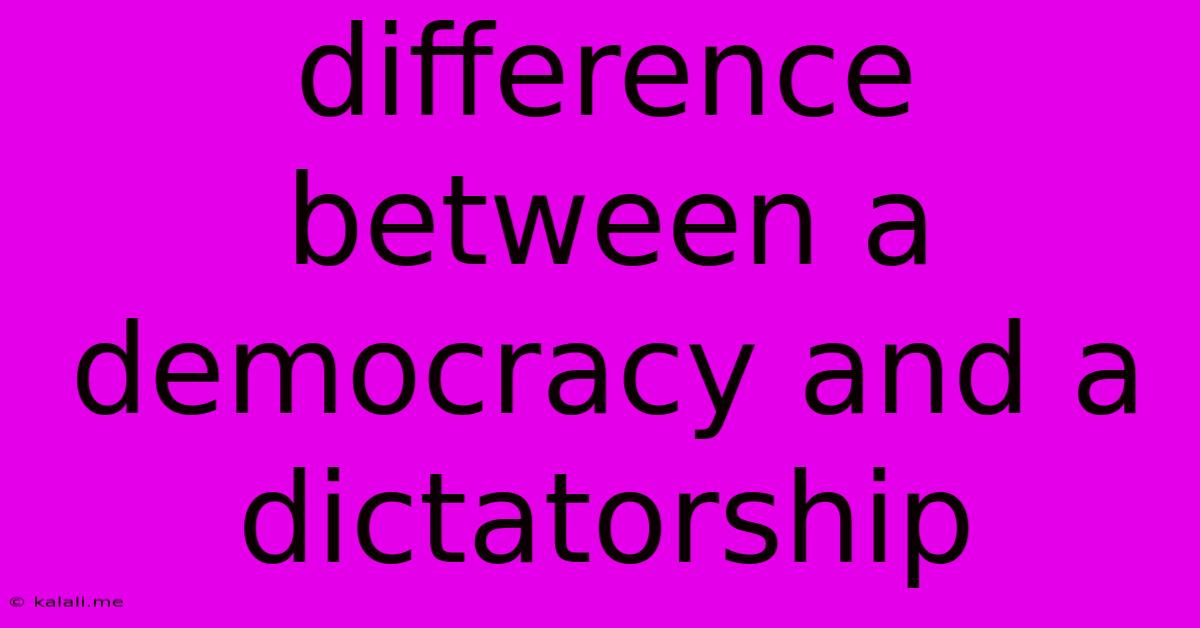Difference Between A Democracy And A Dictatorship
Kalali
Jun 15, 2025 · 3 min read

Table of Contents
Democracy vs. Dictatorship: Understanding the Core Differences
Understanding the fundamental differences between democracy and dictatorship is crucial for navigating the complexities of global politics and appreciating the value of individual liberties. While both systems represent forms of government, their approaches to power, citizen participation, and the rule of law diverge significantly. This article delves into the core distinctions between these contrasting systems, exploring their defining characteristics and real-world implications.
What is a Democracy?
A democracy, derived from the Greek words "demos" (people) and "kratos" (power), is a system of government where supreme power is vested in the people and exercised directly by them or by their elected representatives under a free electoral system. Key characteristics include:
- Rule of Law: Everyone, including those in power, is subject to and accountable under the law. This ensures fairness and prevents arbitrary actions by the government.
- Citizen Participation: Citizens have the right to participate in political decision-making, either directly through referendums or indirectly through elected representatives. This participation can manifest through voting, protesting (peacefully), and engaging in political discourse.
- Free and Fair Elections: Regular, competitive elections are held where citizens can freely choose their leaders from a range of candidates. These elections are characterized by transparency, lack of coercion, and independent oversight.
- Protection of Rights and Freedoms: Fundamental rights and freedoms, such as freedom of speech, assembly, and the press, are guaranteed and protected by law. These rights allow for dissent and open criticism of the government.
- Separation of Powers: Power is typically divided among different branches of government (legislative, executive, judicial) to prevent the concentration of power in the hands of a single entity. This system of checks and balances helps maintain accountability and prevent tyranny.
What is a Dictatorship?
A dictatorship is a form of government characterized by absolute power and authority concentrated in a single person or a small group, often ruling without the consent of the governed. Key characteristics differ drastically from a democracy:
- Authoritarian Rule: A dictator holds absolute power, often achieved and maintained through force, suppression of opposition, and the manipulation of information. There are minimal to no checks on their power.
- Limited or No Citizen Participation: Citizens have little to no meaningful participation in political decision-making. Elections, if held, are often sham elections designed to legitimize the regime rather than reflect the will of the people.
- Suppression of Dissent: Freedom of speech, assembly, and the press are heavily restricted or nonexistent. Dissenting voices are often silenced through intimidation, imprisonment, or violence.
- Lack of Accountability: The dictator and their regime are not accountable to the people or subject to the rule of law. They operate above the law, often using it as a tool for oppression.
- Centralized Power: Power is highly concentrated, often in the hands of a single individual or a small elite group, without meaningful checks and balances.
Key Differences Summarized:
| Feature | Democracy | Dictatorship |
|---|---|---|
| Power Source | The People | A single person or small group |
| Citizen Participation | Significant, through voting and other means | Limited or non-existent |
| Rule of Law | Supreme; applies to everyone | Weak or non-existent; applied selectively |
| Elections | Free, fair, and regular | Rigged or non-existent |
| Rights & Freedoms | Protected and guaranteed | Suppressed and violated |
| Accountability | High | Low or non-existent |
Real-World Implications:
The differences between democracy and dictatorship translate into vastly different lived experiences for citizens. Democracies generally enjoy higher levels of freedom, human rights, economic prosperity, and political stability (although these are not guaranteed). Dictatorships, on the other hand, are often associated with human rights abuses, political repression, economic instability, and violence.
Understanding these core differences empowers citizens to advocate for democratic values and to critically analyze political systems worldwide. The ongoing struggle for democracy highlights the enduring importance of these fundamental distinctions.
Latest Posts
Latest Posts
-
Difference Between An Act And Law
Jun 15, 2025
-
Least Common Multiple Of 21 And 28
Jun 15, 2025
-
Which Of The Following Is Not A Verification Technique
Jun 15, 2025
-
Which Of The Following Is A Disadvantage Of Integrative Bargaining
Jun 15, 2025
-
Match The Three Faults With Their Respective Names
Jun 15, 2025
Related Post
Thank you for visiting our website which covers about Difference Between A Democracy And A Dictatorship . We hope the information provided has been useful to you. Feel free to contact us if you have any questions or need further assistance. See you next time and don't miss to bookmark.